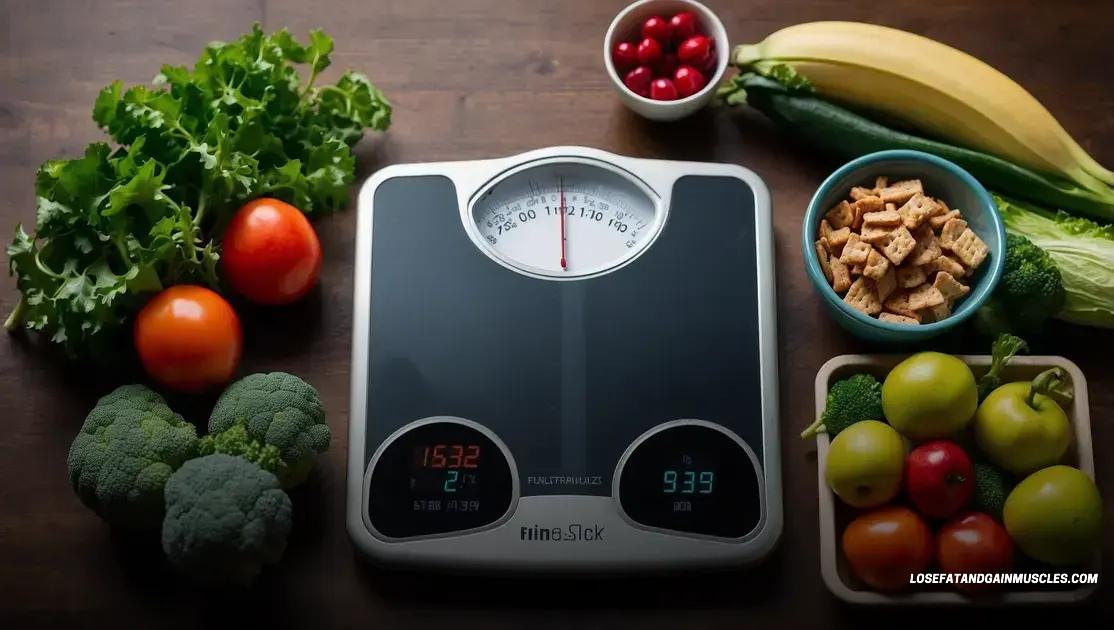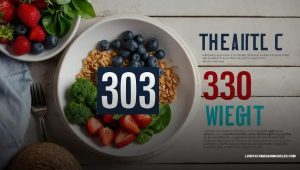How Much Weight Can I Realistically Lose in 21 Days? Find Out Now!
In 21 days, you can realistically lose 3 to 6 pounds by following a balanced diet, incorporating regular exercise, and maintaining a healthy lifestyle. Focus on gradual, sustainable changes rather than quick fixes to achieve effective and lasting weight loss.
If you’re wondering how much weight you can realistically lose in 21 days, you’re not alone. Many people set out on a journey to improve their health with a focus on **realistic weight loss** goals. In this article, we’ll explore what a healthy weight loss rate looks like within a three-week timeline and discuss sustainable strategies that help you achieve realistic results. From effective diets to exercise tips, discover how to set achievable fat loss goals that won’t compromise your well-being.
Understanding Realistic Weight Loss Goals
Setting realistic weight loss goals is essential for success on your journey. It’s important to understand that losing weight takes time and effort. Many people want quick results, but aiming for rapid weight loss can lead to disappointment and unhealthy practices.
What Are Realistic Goals?
According to health experts, losing 1 to 2 pounds per week is considered a healthy and realistic weight loss rate. This means in 21 days, achieving a weight loss of 3 to 6 pounds is feasible for most individuals. Focusing on gradual, sustainable changes helps build healthy habits.
The Importance of Setting SMART Goals
Utilizing the SMART criteria can help in defining your weight loss objectives:
- Specific: Define exactly what you want to achieve.
- Measurable: Track your progress with clear benchmarks.
- Achievable: Set goals that are realistic considering your personal situation.
- Relevant: Ensure your goals align with your overall health objectives.
- Time-bound: Consider a realistic timeline for achieving your goals.
Stay Flexible and Adjust as Needed
Life can be unpredictable, and your weight loss journey may encounter obstacles. It’s essential to stay flexible and open to adjusting your goals as needed. If you’re not seeing the progress you’d hoped for, consider changes to your diet or exercise routine to help you stay on track.
Finding Support and Accountability
Having a support system can improve your chances of success. Whether it’s friends, family, or a workout group, sharing your goals can keep you motivated. Additionally, consider consulting a healthcare or nutrition professional to help customize your plan and provide expert advice.
Healthy Rates of Weight Loss

Understanding healthy rates of weight loss is crucial for anyone looking to shed pounds effectively and sustainably. Most health experts agree that a safe weight loss goal is between 1 to 2 pounds per week. This translates to a total of 3 to 6 pounds over the course of 21 days, which is achievable for many.
Why Slow and Steady Wins the Race
Rapid weight loss might seem appealing, but it often comes with risks. Losing weight too quickly can lead to muscle loss, nutritional deficiencies, and even gallstones. Furthermore, it can be challenging to maintain any weight lost, leading to a cycle of gain and loss.
The Role of Caloric Deficit
To lose weight, you must consume fewer calories than your body burns. A deficit of 500 to 1,000 calories per day is generally recommended to achieve the 1 to 2 pounds of weight loss per week. However, it’s important not to drop below 1,200 calories for women and 1,500 calories for men without medical supervision.
Incorporating Healthy Foods
Focusing on nutrient-dense foods instead of calorie-dense junk foods can help you stay full while creating a caloric deficit. Incorporate plenty of fruits, vegetables, whole grains, lean proteins, and healthy fats into your meals. These foods provide essential nutrients that support your health during weight loss.
Measurement Beyond the Scale
While weight loss is often measured on a scale, it might not tell the full story. Sometimes, the scale doesn’t reflect changes in body composition. Tracking measurements of your waist, hips, and other areas can provide insights into your progress.
Listening to Your Body
A healthy approach to weight loss means being in tune with your body. If you feel fatigued, experience hunger pangs, or notice excessive cravings, it may be time to reevaluate your plan. Adjust your caloric intake or exercise routine as needed.
Best Practices for a 21-Day Diet
When considering a 21-day diet, keeping a few best practices in mind can help you achieve safer and more sustainable weight loss. Making smart choices ensures you not only lose weight but also feel good throughout the process.
Plan Your Meals
Meal planning is essential for success in any diet. By preparing meals in advance, you can ensure you have healthy options available and avoid last-minute temptations for unhealthy foods. Consider setting aside time each week to plan and prep your meals.
Focus on Whole Foods
Choosing whole, unprocessed foods is crucial for a successful diet. Fill your plate with fresh vegetables, fruits, whole grains, lean proteins, and healthy fats. These options are not only more nutritious but also help you feel full longer.
Stay Hydrated
Hydration is often overlooked but plays a significant role in weight loss. Aim to drink plenty of water throughout the day. Staying hydrated can help control hunger and improve your overall energy levels. Try to replace sugary drinks with water, herbal tea, or sparkling water.
Track Your Progress
Keeping a food journal can be beneficial. Documenting what you eat helps you stay accountable and can reveal patterns in your eating habits. By tracking your meals, you can make adjustments as needed and stay committed to your goals.
Be Patient and Consistent
Weight loss takes time and consistency. Understand that not every day will be perfect; however, staying committed to your plan will yield results. Celebrate your small victories along the way to stay motivated during your journey.
Exercise Tips for Effective Fat Loss

Incorporating effective exercise tips into your routine can greatly enhance fat loss during your 21-day diet. Regular physical activity not only helps burn calories but also boosts metabolism and builds muscle.
Combine Cardio and Strength Training
For optimal fat loss, blend cardio workouts with strength training. Cardio exercises such as running, cycling, or swimming increase your heart rate and help burn calories quickly. Aim for at least 150 minutes of moderate-intensity cardio each week.
Strength Training Benefits
Strength training is essential for building muscle. Muscle burns more calories at rest compared to fat, meaning the more muscle you have, the more calories you burn throughout the day. Incorporate strength training 2 to 3 times a week, focusing on major muscle groups.
Try High-Intensity Interval Training (HIIT)
HIIT involves short bursts of intense exercise followed by brief rest periods. This method can be very effective for fat loss as it increases the heart rate and burns calories even after the workout is over. Aim for 20 to 30 minutes of HIIT workouts 2 to 3 times a week.
Stay Consistent and Challenge Yourself
Consistency is key in any exercise program. Set a routine and stick to it. Gradually increase the intensity of your workouts to keep challenging your body. This helps prevent plateaus and keeps your workouts motivating.
Focus on Recovery
Don’t underestimate the importance of rest and recovery. Allow your body time to heal and rebuild muscle after workouts. Aim for at least one to two rest days per week. Recovery strategies may include stretching, yoga, or foam rolling to alleviate soreness.
Common Misconceptions About Weight Loss
Around weight loss, many misconceptions can lead people astray. Understanding the truth behind these myths is key to achieving your weight loss goals.
Myth 1: All Calories Are Equal
While it’s true that a calorie is a calorie, the source of those calories matters. Consuming 200 calories from a chocolate bar has a different effect on your body than 200 calories from almonds. Opt for nutrient-dense foods that provide vitamins and minerals for your overall health.
Myth 2: You Must Eliminate Carbs to Lose Weight
Many people believe that carbs are the enemy. However, carbs are an essential part of a balanced diet, especially when they come from whole grains, fruits, and vegetables. Focus on reducing refined carbs and sugars instead.
Myth 3: Exercise Alone Will Lead to Weight Loss
While exercise is crucial for overall health and supports weight loss, it’s not the only factor. A well-rounded approach that includes both diet and exercise is necessary for effective fat loss. Pairing healthy eating with regular physical activity achieves better results.
Myth 4: You Can Target Fat Loss
Many people wish they could lose fat from specific areas, like their belly or thighs. Unfortunately, spot reduction is a myth. Fat loss occurs throughout the body as you reduce overall body fat. Focusing on a combination of cardio and strength training will help achieve a balanced appearance.
Myth 5: You Must Deprive Yourself to Lose Weight
Severe calorie restriction can lead to quick weight loss, but it’s often unsustainable and unhealthy. Instead of deprivation, aim for a balanced diet with a variety of foods. Allowing treats in moderation can help maintain your mental well-being during your weight loss journey.
In Summary: Achieving Realistic Weight Loss in 21 Days
Weight loss is a journey that requires understanding, patience, and commitment. By setting realistic goals, following a healthy diet, and incorporating effective exercise, you can achieve sustainable fat loss.
Avoid common misconceptions that can derail your progress, and focus on balanced practices that support your health. Remember to stay hydrated, prioritize nutrition, and allow your body time to recover.
With determination and the right mindset, you can reach your weight loss goals in a healthy way within 21 days and continue on the path to improved well-being.
FAQ – Frequently Asked Questions about Weight Loss
How much weight can I realistically lose in 21 days?
A safe and realistic goal is to lose between 3 to 6 pounds in 21 days, aiming for a healthy weight loss rate of 1 to 2 pounds per week.
Is it necessary to eliminate carbs to lose weight?
No, it’s not necessary to eliminate carbs. Instead, focus on choosing whole grains and healthy carbs while reducing refined sugars.
Can I target fat loss in specific areas of my body?
No, spot reduction is a myth. Fat loss occurs throughout the body, and a combination of exercise and diet will yield the best results.
What are some effective exercises for fat loss?
Combining cardio exercises, strength training, and high-intensity interval training (HIIT) can help maximize fat loss effectively.
Do I have to starve myself to lose weight?
No, deprivation is not needed for weight loss. Instead, aim for a balanced diet that includes various foods and treats in moderation.
How important is hydration in a weight loss journey?
Staying hydrated is crucial. Drinking water can help control hunger, improve energy levels, and support overall health.













